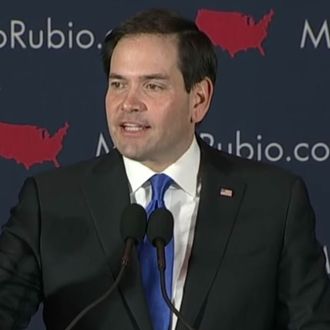
Until last night, the biggest loser of the 2016 election cycle was the political pundit. If the rise of Donald Trump and Bernie Sanders said anything definitive about our politics, it was that the media did not understand its own audience. Over and over again, pundits would blow the whistle on Donald Trump, spend a 24-hour news cycle declaring his foul unforgivable — only to find that the American people actually appreciate a politician who isn’t afraid to stick it to Mexicans/prisoners of war/Muslims/menstruating women/disabled people.
So, when Marco Rubio impersonated the John Birch Society’s first cyborg member at Saturday’s debate and the media declared his performance a five-alarm dumpster fire, some treated its verdict with skepticism.
The candidate himself was no exception. The morning after the debate, Rubio told George Stephanopoulos of his bizarre repetitions, “I would pay them to keep running that [debate] clip because that’s what I believe passionately.”
Then, on Tuesday night in New Hampshire, Rubio edged out the media to become the primary race’s biggest loser. Just days after the GOP Establishment appeared to be coalescing around him, Rubio finished in fifth place, behind Trump, John Kasich, Ted Cruz, and Jeb Bush. In exit polls, 65 percent of voters said the debate influenced their vote.
Last night, Rubio graciously conceded to the media consensus.
“Our disappointment tonight is not on you,” he told supporters. “It’s on me. I did not do well on Saturday night.”
For now, Rubio is polling in third place in national polls and in the upcoming South Carolina primary. But in both cases, he has a fraction of Donald Trump’s support. And most of those polls were taken before he came out as a cyborg built by Glenn Beck.






























